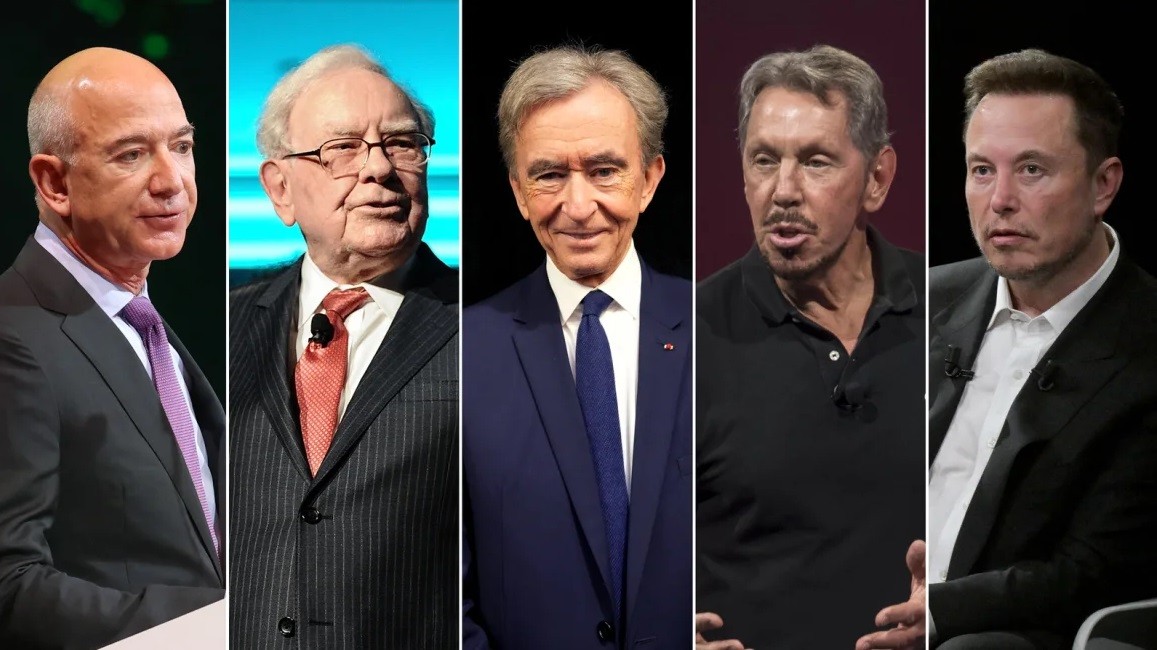World's 5 Richest Men Double Wealth After 2020, Oxfam Reports
Unveiling the staggering growth in affluence, the world's 5 richest men double wealth after 2020, according to Oxfam's report. Let's examine the implications of this wealth surge amid global economic challenges and the call for equitable reforms.
Author:Hajra ShannonReviewer:Paula M. GrahamJan 16, 20241.5K Shares103.2K Views

In a startling revelation, the world's 5 richest men double wealth after 2020. Oxfam's latest inequality report highlights a significant surge in the fortunes of the world's wealthiest individuals since 2020.
The collective net worth of the top five billionaires has escalated by 114%, reaching an astounding $869 billion after adjusting for inflation. This stark contrast in wealth distribution comes at a time when nearly five billion people worldwide are grappling with the harsh realities of inflation, war, and climate crises.
Nabil Ahmed, Oxfam America’s director of economic and racial justice, reflects on this disparity.
“„We find ourselves in a new Gilded Age, but workers, regulators and union and community organizers are starting to make cracks in it.- Nabil Ahmed
Wealth Surge Of The Elite
The report, coinciding with the World Economic Forum meeting in Davos, Switzerland, draws on Forbes data to underscore the widening gap between the rich and the poor.
Elon Musk, known for leading companies like Tesla and SpaceX, stands out with an extraordinary wealth increase. His net worth reached an astounding $245.5 billion by the end of November, marking an increase of 737% from March 2020, even after adjusting for inflation.
Bernard Arnault, the chairman of the French luxury goods conglomerate LVMH, along with his family, saw their net worth climb to $191.3 billion, reflecting a 111% increase. This significant growth underscores the expanding fortunes of those at the very top of the wealth pyramid.
Amazon’s Jeff Bezosand Oracle’s Larry Ellisonhave not been left behind in this wealth accumulation race. Bezos’s fortune has grown to $167.4 billion, up 24%, while Ellison’s wealth now totals $145.5 billion, showing a 107% increase.
Warren Buffett, the CEO of Berkshire Hathaway, though not experiencing growth as dramatic as some of his peers, still saw his net worth rise by 48% to $119.2 billion.
This growth in billionaire wealth, totaling $3.3 trillion, or 34%, since 2020, outpaces inflation by three times.
The Corporate Power Dynamics
Oxfam's report delves into the role of corporate profits in fueling this wealth increase. A staggering 70% of the world's largest public companies are either led by a billionaire CEO or have one as a principal shareholder. The top 1% globally holds 43% of the world's financial assets, with even higher percentages in specific regions like Asia and the Middle East.
148 of the world's largest corporations made nearly $1.8 trillion in profits in the 12 months leading up to June 2023, a 52.5% increase compared to the average between 2018 and 2021. Industries like oil and gas, pharmaceuticals, and finance have been particularly profitable. Ahmed warns, “We ignore at our peril the role of monopoly power in redistributing wealth to the top.”
In response to these findings, Oxfam is urging governments to take action. Amitabh Behar, Oxfam International’s interim executive director, emphasizes the need for governmental intervention: “Public power can rein in runaway corporate power and inequality — shaping the market to be fairer and free from billionaire control.”
The Inequality Crisis And Call For Action
The report, titled "Inequality Inc.", presents a grim picture of the current economic landscape. Despite the immense growth in wealth for some, 5 billion individuals have become poorer in the same period. The report predicts the emergence of the world's first trillionaire within a decade, yet the eradication of poverty seems to be a distant goal, achievable in nearly 230 years at the current rate.
Behar's statement encapsulates the urgency of the situation: “We’re witnessing the beginnings of a decade of division, with billions of people shouldering the economic shockwaves of pandemic, inflation, and war, while billionaires’ fortunes boom. This inequality is no accident; the billionaire class is ensuring corporations deliver more wealth to them at the expense of everyone else.”
Oxfam's report also highlights diminishing corporate tax contributions, exacerbating inequality. The proposed solutions include capping CEOs' pay, dismantling private monopolies, and introducing a wealth tax, which could generate $1.8 trillion annually.
Behar concludes with a call to action: “Governments must intervene to break up monopolies, empower workers, tax these massive corporate profits and, crucially, invest in a new era of public goods and services.”
This underscores the urgent need for systemic changes to address the growing chasm between the rich and the poor, a divide that threatens the very fabric of global society.

Hajra Shannon
Author

Paula M. Graham
Reviewer
Latest Articles
Popular Articles